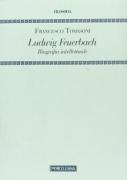Ludwig Feuerbach

One of the difficulties in drafting the intellectual biography of a philosopher is the attempt to systematize what, by definition, is "in progress": the thought. But when one tries to reconstruct its evolution, in its theoretical nodes analyzed for a time-life, the biographical model seems to fail. This is the paradox of the thought whose movement, in Ludwig Feuerbach (1804-1872) as mostly of the speculative minds, is in the constant questioning on a single issue, in his case on the relationship between philosophy and religion: a long-term comparison, which unfolds under the sign of concepts as life, death and immortality; essence , history and existence; individuality and empiricism; man, nature and naturalism. Topics, addressed in the chapters of the book, that seriously face a problem and become points of observation, according to an hermeneutic model advocated by Feuerbach himself, who makes the questioning the essence of philosophy.
This biography succeeds on one side to return a total portrait of Feuerbach, with extensive references to letters, writings of the early period and unpublished documents - result of a study of more than thirty years and of the consultation of Nachlass - ; on the other to question the most critical theoretical points and the dominant opinions.
A reference work for historians, destined to rewrite the interpretation of the German philosopher.